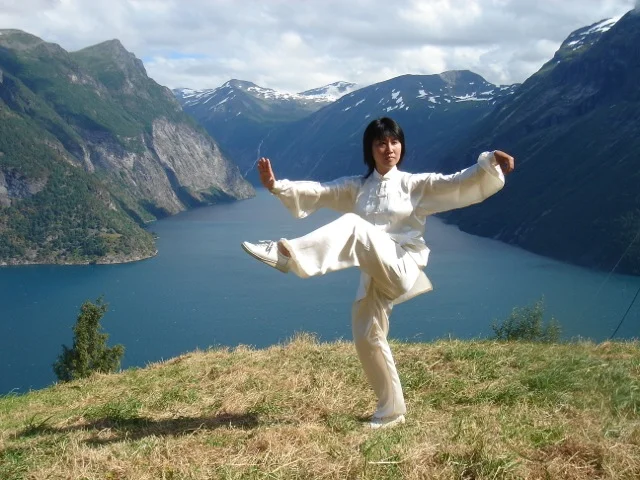Meet Li Jing
Li Jing was born in Beijing, China and has lived and traveled around the globe while gratefully accumulating experiences with family, teachers, and friends. Named Jing (Peace and Tranquility) by her parents, she began learning Wushu from her father, Li Junfeng, who was the head coach of the Chinese National Wushu team and chief coach of the Beijing Wushu Team. Jing graduated Örebro University’s School of Health Sciences in Sweden and lives in Germany with her husband and two children.
In her doctoral study, Jing focused on explicating the Chinese cultural knowledge of the Heart (The capital letter ‘H’ is used to differentiate the Chinese concept of ‘Heart’ from the English ‘heart’). In her research studies, Jing discovered that xin 心 is often translated into English as “mind”. This translation fails to transmit the full meaning of the word that is deeply rooted in Chinese culture, thereby omitting or obscuring much of xin’s significance in cultural knowledge, which hinders the understanding of those relying on the English language as a source to grasp the complete concept of the Heart.
In her study, Jing concludes that the Chinese cultural meaning of Heart contains both the physical heart and the ‘Heart’ that we cannot see, in terms of eight aspects: emotions, virtue, wisdom, concentration, desire and vision, attitude and Heart is the source of physical and mental life.
The result of Jing’s research is summarized below:
xin and emotions: "Heart is the seat of all emotions 情志之傷,雖 五臟 各有所屬,然求其 所由, 則無不從心而發”
xin and the physical heart: "The Heart is the master of all the internal organs 心者, 五臟六腑之大主也”
xin and mind: “The Heart governs the mind, it is in control of the mind. 心者, 君主之官,神明出焉”
xin and virtue: Heart is the carrier of human nature and the soul. 心靈; 明心見性”
xin in terms of its ability to think and know: "The Heart is an organ for thinking. 心之官則思”, it is also an organ responsible for memory, perceptions, etc. Traditional Chinese medicine, as well as Chinese thinker regard wisdom as originating from the Heart. “The Heart is the house of wisdom. 心也者, 智之舍也”
xin and concentration: Chinese attribute the concentration ability to the Heart. In the Buddhist tradition, concentration is an ability of the Heart to focus on ‘now’ and ‘this’. “When the Heart is very concentrated toward one goal, nothing is impossible. 制心一處無事不辦”
xin, desire and vision: Since the Heart is an organ for thinking, therefore, desire which is produced by the heart. “The best way to nourish Heart is to reduce desires. 養心莫善於寡慾” . Opening our Heart to a broader vision, so that we can make good decisions in life in order to reach a peaceful state.
xin, a way of life and attitude: Harmony is one of the highest principles in ancient Chinese philosophy. Laozi believes cultivating xin is a way to understand Dao. Heart also directs our attitude. It is a common sense that a good attitude and a clear mind lead to a life of harmony.
For more, please click https://academicjournals.org/article/article1379496939_Li%20et%20al.pdf
Through the study of the Chinese concept of "Heart", Li Jing has further understood the importance of the Sheng Zhen practice — to relax the body to welcome energy flow, open the heart to gain clarity and wisdom, purify the Heart to broaden the vision toward life and the world, and connect the Heart with nature and the universe to be in harmony! May peace and tranquility be an experience of the Heart.

